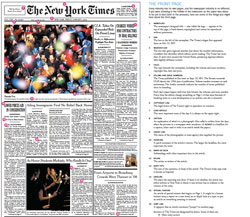Please note that this calendar is designed to be flexible: we may make changes along the way, depending on your interests and the needs of the class. Should you miss a class, you are responsible for knowing about—and adjusting for—any changes by getting notes and other materials from a classmate. Professional protocols and collegiality call for you to alert us if you’ll be missing on a day when we’re having a workshop or when you are scheduled to present materials.
 Week 1 Week 1Introductions, key concepts, & course goals St. Martin’s Handbook, Chapter 1: Expectations for College Writing |
|
| Thursday, September 10th | In class: Introductions, key concepts, & course goals Due: Course Survey Preview:
|
| Tuesday, 9/15 | In class: NYT as assigned — I’ll email instructions on Sunday Due: article summary on Frank Bruni’s “Measuring a College’s Value” — Sunday Review section, page 3 — bring it in digital form, emailed to yourself, or on your laptop; we’ll need the digital version so that we can post them to your Digication site. Here’s my example. |
 Week 2 Week 2Summary & Analysis St. Martin’s Handbook, Chapter 8 |
|
| Thursday, 9/17 |
In class: NYT, continued Due: #1: post your revised initial, first summary in précis form, and keep both versions; we want to be able to see your original summary and the revised version, in précis form. Here’s one possible organizing principle for that. Due #2: Rhetorical précis — your choice St. Martin’s Handbook:
For class discussion, we’ll focus on p. A1 and the Sunday Review section — come prepared to discuss. |
 |
|
| Tuesday, 9/22 | In class: For class discussion, we’ll focus on p. A1 and the Sunday Review section — come prepared to discuss. Due: Rhetorical précis — Manne, “Why I Use Trigger Warnings” |
 Week 3 Week 3Reading and writing rhetorically: ethos, pathos, & logos |
|
| Thursday, 9/24 |
Due: Rhetorical précis: 9:40 section: Douthat, Evangelicals and the Carson Illusion 1:00 section: Sunstein, Making Government Logical Reading: NYT, as assigned Sunday via email: In class: We will begin class by going around the room and hearing an informal 60-90 second overview of an interesting article that you read in the Sunday NYT — any section, any topic — why it was important and relevant to you, and why it should be important and relevant to us. It’s a great way to get a tour of the Sunday paper, and to find out what people are interested in. Page One: Inside the New York Times — no longer on Netflix, but is available via Hulu and Amazon Prime — free trials are available for both. |
| Tuesday, 9/29 |
In class: NYT as assigned; Brooks: The American Idea and Today’s G.O.P., which we’ll use as a test case: if we were going to write a rhetorical analysis of this essay, how would you do that? Due: Annotated copy of a NYT article for your Rhetorical Analysis St. Martins Handbook PART TWO—Critical Thinking and Argument 7. Reading Critically |
 Week 4 Week 4Planning and drafting a rhetorical analysis & individual conferences — schedule and sign-up TBA |
|
| Thursday, 10/1 |
Reading: NYT, as assigned: In class: Writing Center Presentation; moving from summary to rhetorical analysis St. Martins Handbook PART TWO—Critical Thinking and Argument 7. Reading Critically |
| Tuesday, 10/6 |
In class: NYT, continued; peer reviews Due: Rhetorical Analysis draft #2 |
 Week 5 Week 5Advocacy and Argument: Op-Ed Project … and why you’ll want to be in a good writing group the next several years |
|
| Thursday, 10/8 |
Reading: NYT, as assigned TBA |
| Sunday, 10/11 | Mid-term self reflection |
| Tuesday, 10/13 |
In class: NYT, continued Preview Letters to the Editor:
Last names A-L: submit by Thursday, 10/29, and BCC me |
 Week 6 Week 6Writing workshops: advocacy and argument |
|
| Thursday, 10/15 |
No class meeting Due: Op-Ed inquiry question & your 500-word exploratory essay; yellow-highlight your best, or most interesting, or most compelling, or most intense sentence. |
| Tuesday, 10/20 |
NYT, as assigned Due: Op-Ed project 2nd draft |
 Week 7 Week 7Advocacy and Persuasion |
|
| Thursday, 10/22 |
Due: Op-Ed project 2nd draft |
|
Due Sunday 10/25: Phenomenological-reading peer reviews, via SoundCloud What we’re looking for is your experience reading the essay — how it made you feel, not making corrections. So we’d expect to hear you saying things like,
Post your SoundCloud link to Digication. |
|
| Tuesday, 10/27 | Reading: NYT, post reading notes for “My Dark California Dream” to your Digication Reading Journals page
In class: Revising & editing workshop
|
 Week 8 Week 8Editing and Proofreading |
|
| Thursday, 10/29 |
Reading: NYT, as assigned St. Martin’s Handbook:
Due: Op-Ed, final draft with project reflection, and one before-and-after PIE paragraph Preview: Remix the New York Times |
| Tuesday, 11/3 |
In class: Remixing the New York Times workshop |
 Week 9 Week 9Remixing the New York Times |
|
| Thursday, 11/5 | Reading: NYT, “The Moral Bucket List” — post your reading notes to Digication under journals In class: Remixing the New York Times workshop Due: Remix “draft” #1 — can be messy & rough — photo, sketch, etc. |
| Tuesday, 11/10 |
Reading: NYT, as assigned |
 Week 10 Week 10Conclusion and portfolio development |
|
| Thursday, 11/12 | In class: Digital Portfolio Workshop |
| Tuesday, 11/17 |
Portfolio workshop and editorial feedback You can work on your portfolios during this time; we will problem-solve any technical or organizational issues; and we will discuss editing and visual, logistical coherence. |
 Finals Week Finals Week |
|
Our scheduled exam time, when we will meet for the final, official delivery of your WRD103 Digital Writing Portfolios:
|
|


